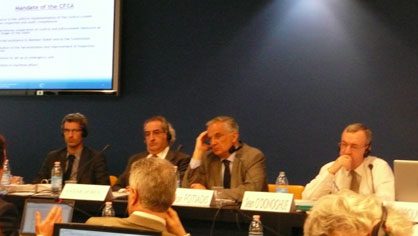16 March 2009
Federation representatives recently attended a major three-day meeting with senior Commission officials, including Director General, Fokion Fotiadis, on the future reform of the Common Fisheries Policy.
The meeting was held in Rome and, along with a large number of Commission officials, was attended by representatives of major fishing organisations from across Europe.
The purpose of the meeting, organised jointly by Europeche, the European Association of Producer Organisations and Cogeca ( the association of fishing cooperatives) was to discuss the contents of the Commission’s forthcoming Green Paper on CFP reform. The Green Paper is expected to be published at the end of April and will signal the start of a year long debate on the reforms. It is planned that the revised CFP will take force from 1st January 2013, although many of the measures would be phased in after that date.
It is already clear that the Commission plan a very deep reform of the CFP. Although the Commission’s earlier working paper was criticised for painting a picture of unrelieved gloom on the state of the Community’s fish stocks, many of the reforms signalled by the Director General were in a direction that the NFFO would applaud.
A break with the one size fits all approach, the transfer of powers and responsibilities from the centre to the regions, to member states and to the fishing industry, are all part of the Commission’s current thinking. At the same time, the Commission made very clear that the general economic climate would make conditions in the fishing industry very difficult in the near future. Whilst member states are dealing with their “monumental debts” this is bound to have an impact on the funding available to the successor to the European Fisheries fund after 2013.
Although a number of the planned reforms are in the direction that the NFFO has been arguing for over a number of years, it is not likely that those arguments have suddenly proved persuasive. Rather, a major driver for the proposed changes is the financial cost of applying a centralised, command and control system and the meagre results.
The cost to the public purse of managing and enforcing European fisheries frequently exceeds the net revenue of those fisheries; and the CFP was the recent subject of the most savagely critical report by the European Court of Auditors in the history of the European Union. In the current circumstances the status quo is seen as untenable. Hence the newfound interest in devolving management responsibility.
Whilst welcoming radical CFP reform, the NFFO is wary of the dangers of throwing the baby out with the bathwater, particularly with regard to any ill-thought through move away from the principle of Relative Stability. The meeting provided the opportunity to warn of the dangers of undermining national quota management arrangements that in some member states were quite sophisticated and already adhered to the principles of rights based management. The Commission was at pains to emphasise that any change would be evolutionary rather than revolutionary and the stability remained a fundamental objective.
It was interesting to hear that the Commission intended to build in a facility to take a step backwards if it judged that it had made a mistake. This kind of adaptive approach would be very welcome and would certainly contrast with the god-like posturing of the past.
The Commission remains of the view that the sector’s profitability and therefore resilience to external shocks, is undermined by fleet overcapacity, although during the meeting it was forced to concede that some member states and some fisheries had made huge efforts to address the issue through publically funded decommissioning schemes. The Commission also agreed that effort control was a profoundly anti-economic instrument, only justifiable where member states have not adequately dealt with the overcapacity issue.
A huge number of issues were addressed over the course of the three day meeting including:
- Approaches to discard reduction
- Results based management
- Long term management plans
- Industry self-management
- Inshore and offshore fisheries
- Markets
- Coherence between different parts of the policy
- Control systems
- Margin of tolerance
- External fisheries
The Federation will be preparing a formal written response to the Green Paper when it is published but this meeting provided an invaluable insight into what had been included in the Green Paper and why. It also afforded the fishing industry an opportunity to raise a number of critically important issues.

